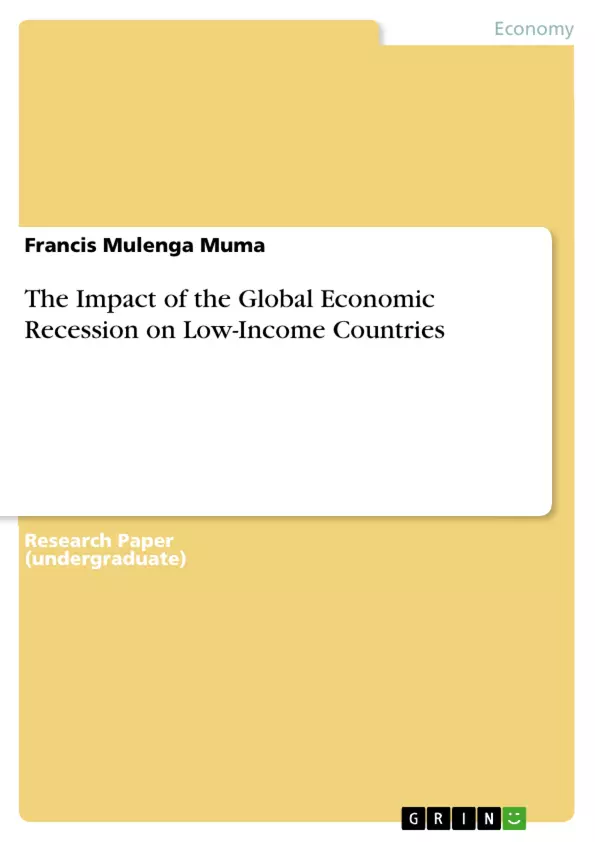This paper has attempted to analyze the Impact of the past current Global Economic Recession on Low Income Countries (LICs), by showing how it started, its impact on the real economy and how it spread to the LICs. Further the Paper has tried to highlight policy choices confronting the LICs in order to mitigate the crisis and avoid the recurrence of further crisis in future.
Table of Contents
- ABSTRACT
- 1.0 Introduction
- 2.0 The Genesis of the Current Financial Crisis
- 3.0 How the Global crisis had a devastating toll on Low-Income Countries
- 3.1 Channels of Impact
- 3.2 Resource Implications and Policy Responses
- 3.3 Limited scope for counter-cyclical spending
- 3.4 Incremental spending accounts for relatively little of the deficit increase in LICs
- 4.0 Policy choices confronting the Global Economy
- 4.1 Developing countries
- 5.0 Observations
- 6.0 Conclusion
- References
Objectives and Key Themes
This paper aims to provide an overview of the global economic recession and its impact on Low-Income Countries (LICs). It examines the origins of the financial crisis in the United States, explores how the crisis affected LICs through various channels, and discusses policy choices confronting both developing and developed countries.
- The origins and spread of the global financial crisis
- The impact of the crisis on Low-Income Countries
- Policy responses to the crisis in both developed and developing countries
- The need for diversified economies in LICs
- The role of international financial institutions in supporting LICs
Chapter Summaries
The paper begins with an introduction that provides context for the topic of the global economic recession and its impact on LICs. Chapter 2 delves into the genesis of the current financial crisis, highlighting the role of securitization in the US mortgage market and the impact of credit default swaps on financial stability.
Chapter 3 examines how the global crisis has affected LICs, exploring various channels of impact such as commodity prices, trade, and capital markets. The chapter also discusses resource implications and policy responses for LICs, including the limitations of counter-cyclical spending.
Chapter 4 explores policy choices confronting the global economy, focusing on the need for coordinated stimuli packages and the importance of developing countries having more policy space and less conditionality attached to international lending.
Keywords
The main keywords and focus topics of this paper include: global economic recession, financial crisis, Low-Income Countries (LICs), securitization, credit default swaps, commodity prices, trade, capital markets, policy responses, stimuli packages, international financial institutions, and development.
Frequently Asked Questions
How did the global economic recession start?
The crisis began in the United States, triggered by securitization in the mortgage market and the impact of credit default swaps.
What was the impact on Low-Income Countries (LICs)?
The recession hit LICs through reduced trade, falling commodity prices, and decreased capital flows, taking a devastating toll on their real economies.
Why do LICs have limited scope for counter-cyclical spending?
Due to restricted fiscal space and lower resource implications, LICs often cannot afford the massive stimulus packages used by developed nations.
What policy choices are recommended for developing countries?
The paper suggests diversifying economies, seeking coordinated global stimuli, and advocating for less conditionality on international loans.
How can future crises be avoided in LICs?
Strengthening internal economic structures and improving the support role of international financial institutions are key observations in the study.
- Quote paper
- Dr. Francis Mulenga Muma (Author), 2010, The Impact of the Global Economic Recession on Low-Income Countries, Munich, GRIN Verlag, https://www.grin.com/document/198159



